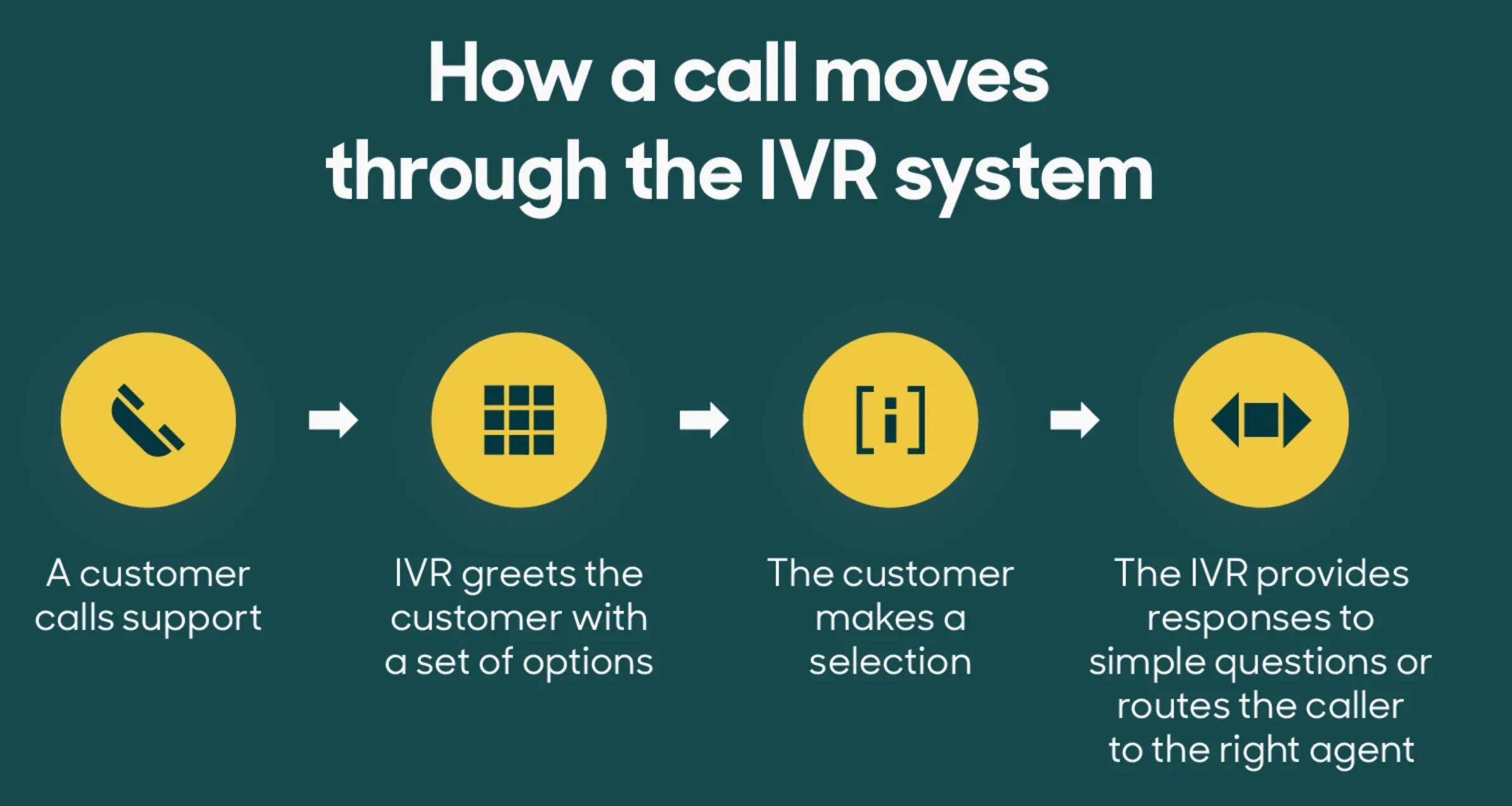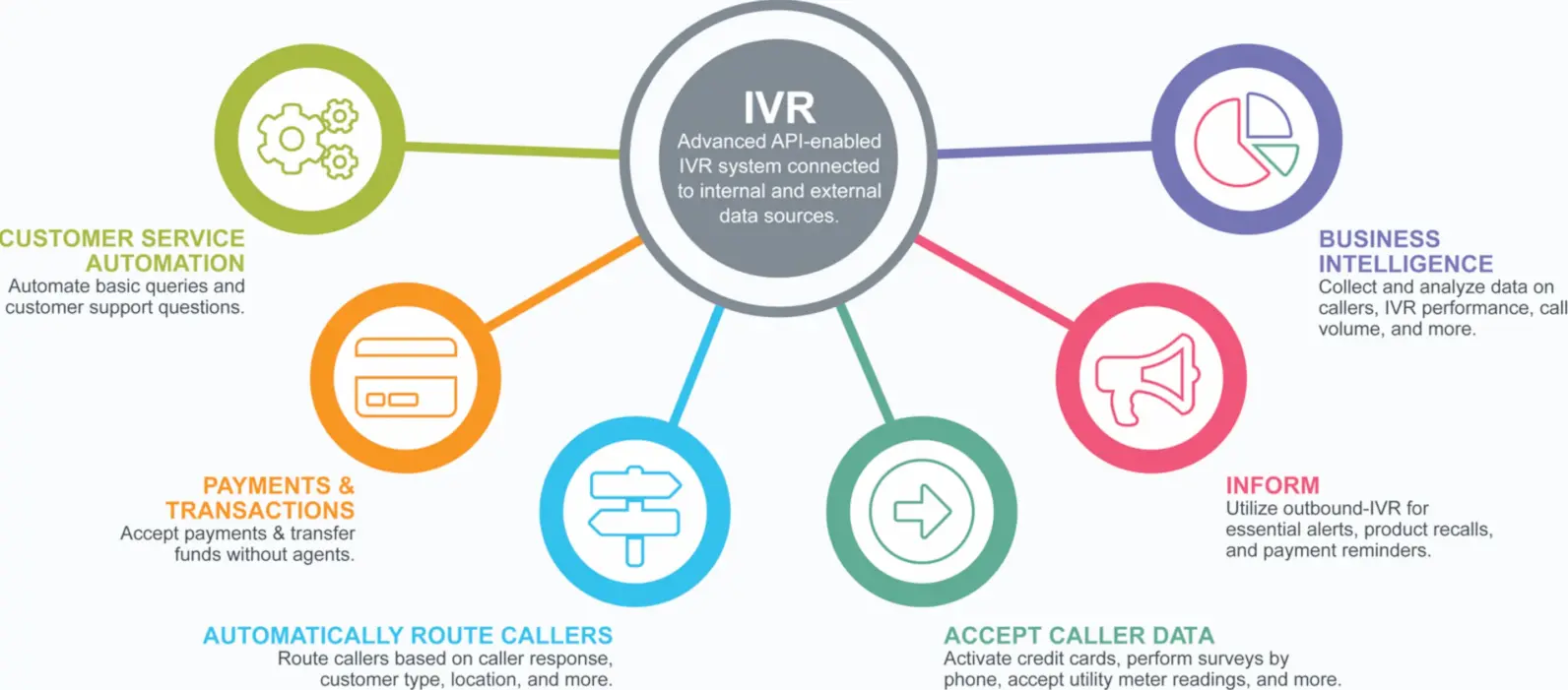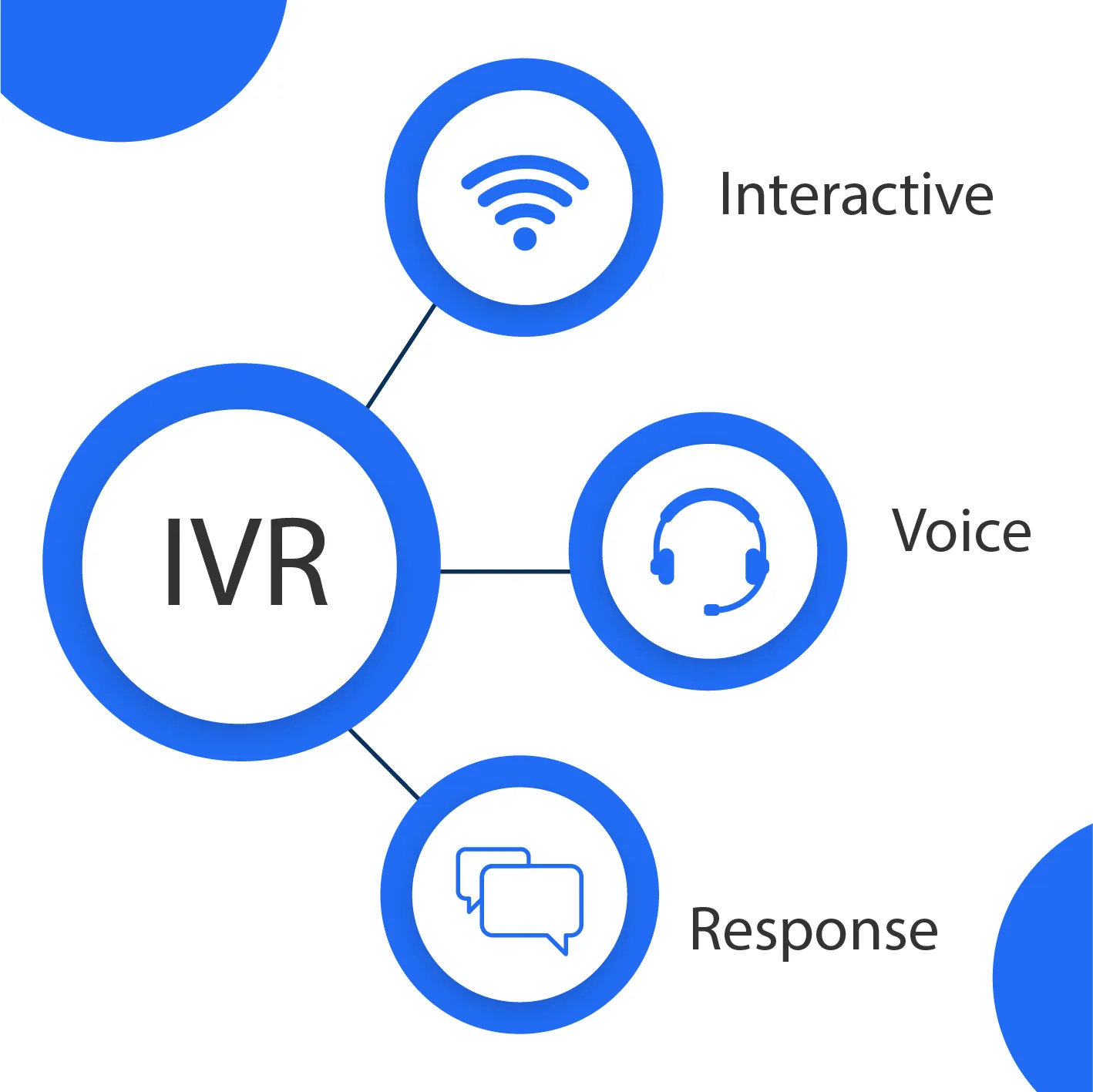What is IVR?
Hey there! Ever called a customer service hotline and been greeted by an automated voice? That's an Interactive Voice Response (IVR) system for you.
It's a technology that allows a computer to interact with humans through voice and touch-tone inputs from a telephone keypad.
History of IVR technology
Let's take a trip down memory lane. IVR technology first made its appearance in the 1970s.
It started with simple call routing and has now evolved into a sophisticated tool that can handle complex tasks and integrate with other systems.
Importance and Benefits of IVR Systems
IVR systems are a big deal, and here's why: They save time and money by automating routine tasks, provide 24/7 support, offer personalized customer experiences, and can even help with information collection and analytics.
How IVR Systems Work
Here is the working of IVR Systems

IVR System Components
IVR systems are like a delicious cake with several layers. You've got the telephony equipment, the IVR software (the brain behind it all), and the database that stores all the relevant information.
Put them together, and you've got yourself a smooth-running IVR system.
Call Flow in an IVR System
Picture this: You dial a number and the IVR (Interactive Voice Response) system answers. It plays a welcoming message, followed by menu options.
You press a key on your phone, and voila! You're connected to the right department or given the information you need. That's call flow in action!
Integration with Other Technologies
IVR systems love making friends with other tech. They can integrate with Customer Relationship Management (CRM) systems, Artificial Intelligence (AI) tools, and even social media platforms.
The result? A seamless and convenient experience for callers.
Types of IVR Systems
There are different types of IVR Systems-
Inbound IVR
Inbound IVR systems are like the friend who's always there when you need them. They handle incoming calls, providing information or routing the call to the right person or department.
Outbound IVR

Outbound IVR systems are the proactive pals, making calls to customers for things like appointment reminders, surveys, or even promotional campaigns.
Visual IVR
Visual IVR is like the cool kid on the block. Instead of navigating through voice prompts, users can interact with a visual interface on their smartphones or computers. Fancy, huh?
Who Uses IVR Systems?
Various Industries and Businesses which can use IVR (Interactive Voice Response) systems are-
Industries that benefit from IVR
IVR systems are popular in various industries, such as banking, healthcare, retail, and telecommunications.
They're the versatile and reliable friend every industry wishes to have.
Common Use Cases for IVR Technology
From bill payments to appointment bookings, IVR systems can handle a wide range of tasks.
They're also great for providing customer support, conducting surveys, and even offering language options for a diverse clientele.
Choosing the Right IVR Solution
Things to keep in mind before choosing the IVR (Interactive Voice Response) Solution:
Assessing your Business Needs
Before you dive into the world of IVR solutions, take some time to assess your business needs.
Consider factors like call volume, the complexity of customer inquiries, and the level of personalization you want to provide.
By understanding your business's unique requirements, you'll be better equipped to choose the right IVR solution.
Comparing IVR Vendors and Platforms
When it comes to IVR vendors and platforms, you've got plenty of options. To find the best fit for your business, compare features, pricing, scalability, and customer support.
Don't be afraid to ask for demos and trial periods to ensure that you're making the right choice.
Key Factors to Consider When Selecting an IVR System
When evaluating IVR (Interactive Voice Response) systems, keep these key factors in mind:
- Ease of use: Choose an IVR system with a user-friendly interface and intuitive menu options.
- Customizability: Ensure that the IVR solution allows you to create custom call flows and scripts tailored to your business needs.
- Integration capabilities: Look for IVR systems that can integrate with your existing CRM, AI tools, and other communication channels.
- Scalability: Opt for an IVR solution that can grow with your business, accommodating increased call volumes and expanding features.
- Security and privacy: Prioritize IVR systems with robust security protocols to protect sensitive customer information.
Key Features of IVR Systems

Here are the Key Features of IVR Systems:
- Customizable call menus: One size doesn't fit all, and IVR systems know that. They allow businesses to create custom call menus to cater to their specific needs and preferences.
- Text-to-speech and speech recognition: IVR systems are great communicators. They can convert text to speech for prerecorded messages and use speech recognition to understand spoken commands from callers.
- Call routing and transfers: IVR systems are like skilled traffic cops, ensuring calls are directed to the right department or agent. This helps businesses provide efficient and timely support to their customers.
IVR System Best Practices
Best Practices for Using IVR (Interactive Voice Response) System:
- Designing user-friendly IVR menus: No one likes a confusing menu. Keep it simple and intuitive by limiting the number of options and providing clear instructions for callers.
- Effective scriptwriting: A well-written script is essential for a pleasant IVR experience. Keep the language simple, concise, and friendly.
- Regular monitoring and optimization: IVR systems, like any good friend, need regular check-ins. Monitor performance, gather feedback, and make tweaks to ensure your IVR system is always at its best.
Challenges and Limitations of IVR Systems
Here are the different Challenges and Limitations of IVR Systems
User Frustration with Automated Systems
While IVR systems have their benefits, some users may still feel frustrated with automated systems.
They might prefer speaking to a live representative, find the menu options confusing, or feel that their issue is too complex for an automated system to handle.
To minimize user frustration, it's essential to ensure that your IVR system is user-friendly, with clear and concise menu options, and always provide the option to connect with a live representative if needed.
Language and Accent Barriers
IVR systems can sometimes struggle with understanding accents or dialects, which might lead to miscommunication and user frustration.
To overcome this challenge, consider offering multiple language options and investing in advanced speech recognition technologies that are better equipped to handle a wider range of accents and dialects.
Security and Privacy Concerns
IVR systems often handle sensitive information, such as credit card numbers or personal details, so ensuring the security and privacy of this data is crucial.
Implement strong encryption methods, adhere to data protection regulations, and regularly update your security protocols to safeguard your customers' information.
Suggested Reading:
Innovative Use cases of IVR Systems in Different Industries
The Future of IVR Technology
As mentioned earlier, AI is revolutionizing the world of IVR (Interactive Voice Response) systems.
Artificial Intelligence and IVR
From natural language processing to predictive analytics, AI-powered IVR systems can offer improved customer experiences, efficiency, and personalization.
As AI technology advances, we can expect even more innovative applications in the IVR space.
Personalized Customer Experiences
The future of IVR technology lies in personalization. By leveraging customer data and AI, IVR systems can deliver personalized experiences tailored to each individual's preferences and needs.
This will not only improve customer satisfaction but also lead to increased customer loyalty and revenue.
Omnichannel Integration
Omnichannel integration will play a significant role in the future of IVR.
By seamlessly connecting IVR systems with other communication channels, such as email, chatbots, and social media platforms, businesses can provide a unified and consistent customer experience across all touchpoints.

